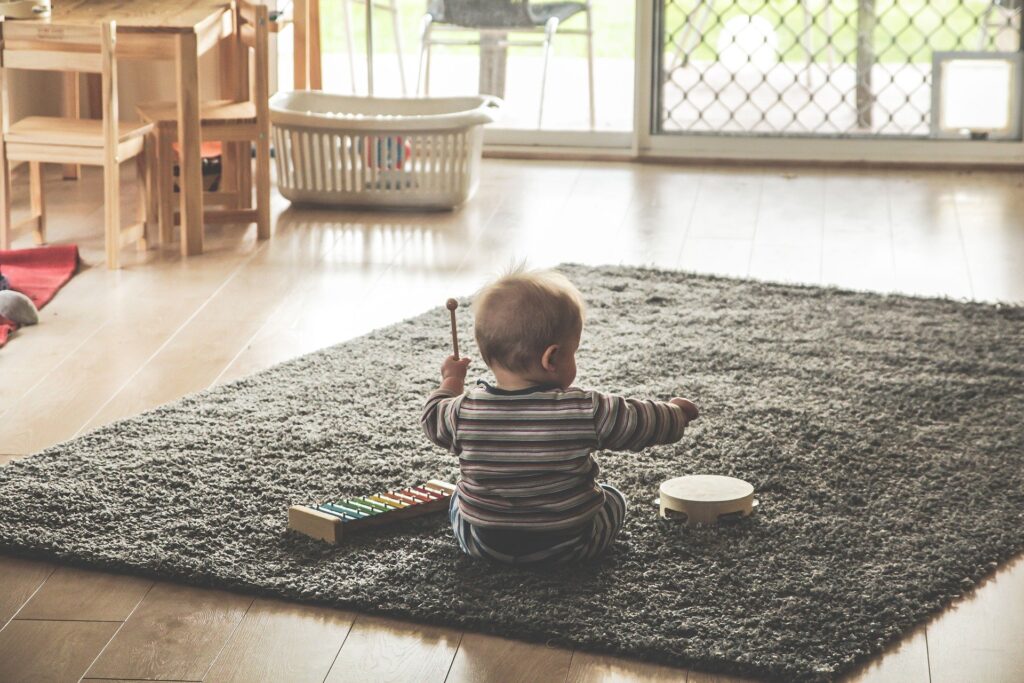In this series of articles (‘Do we understand our child?’) Diana Radeva, child and adolescent psychotherapist sets out to consider the emotional life of children from birth onwards; and how relationships between children and parents evolve over time. It is a view of human growth, which recognises the importance of strong feelings experienced at each stage of development; thus offering ways that parents might find helpful when wanting to better understand their children’s growth.In the final article in the series Diana looks at the middle months of baby’s first year.

So the first year of life is over. At the age of one, babies who are still very physically and emotionally dependent on others, face different kind of developmental challenges and joys.
How do conversations start?
Many parents are convinced of the value of talking to preverbal babies. Even if the children don’t yet understand what all the words mean, they will be getting the message that words have meaning and that words can relate to an experience of being emotionally held in someone else’s mind. Eventually the time will come when the first words are spoken. Generally the time is somewhere towards the end of the first year.
For our one-year old, every new move forward comes at a cost. The world of language is a joy and can link the young child up with others in a wonderful, enriching way. At the same time making new links with others inevitably means being more separate from the intensity of that first mother-baby relationship. This is an emotional leap, as well as cognitive, and babies need to do it in their own time.
Through stories, books and nursery rhymes, parents are introducing their babies to the creativity of language and narrative. They are reinforcing an understanding of the way language can be used to hold a story together – their own story or perhaps someone else’s.
First steps and building up confidence
Everything does change when our baby starts moving. The feeling of being in charge of where you go must be wonderful. The world gets bigger. The process of learning to walk and feeling confident enough for those first steps is psychological as well as physical. It is another major emotional leap, full of conflict for the baby. Our baby may need to come to us again and again for hugs and reassurance as they start these first steps. The baby can build in confidence only through repeated experience of moving away from us, returning for reassurance and finding it in us, and then moving away again
The value of exploration
The first important relationship a baby has is with the mother. Quite naturally the mother becomes the first object of fascination and curiosity. One can imagine the kind of questions: What is the mother on the inside? How does her breast come to be full of milk? Who does she love? And so on. If this kind of intense curiosity can be tolerated without too much worry, by mother and baby, then the baby will feel confident to take such curiosity even further.
For a one-year-old, what first began as a fascination with everything about the mother can now be transferred into a fascination and curiosity in everything else. Parents who encourage this curiosity are at the same time supporting their one-year-old’s emotional and psychological development – helping them to move on and engage with enthusiasm in the wider world.
Play
Play is a wonderful arena in which curiosity and imagination can thrive and develop. Whereas the baby’s first fascination is their mother and all she contains in her heart, mind and body, this progresses to something more symbolic; a fascination of containers in general. Finding a container or a containing space and putting things inside it seems to be a baby’s way of exploring the potential safety of the world.
Playing with our baby and paying close attention to following his or her lead can help us understand something about their current feelings and preoccupation as they spread out before us in the drama of the game.
Different kinds of families
Families are different in many ways. In some families both parents are living together with the children. Other families have single parents and the emotional and practical support of an extended family, while some single parents rely more on a close network of friends or local services. However the group is made up, its family has its own culture and ways of thinking about children.
All families undergo strain at different times; this is part of life. The pressure might be emotional or financial: the marriage might be in difficulty, one of the parents may have left the family, there may be a bereavement or a long-term illness to cope with, unemployment, long periods of absence from home and so on. Whatever it is, children are never immune to what is happening in the family even when they are too young to put their feelings into words. This can often be a very painful realisation for parents who have, above all, wanted to protect their children. But, in fact, recognising that family issues will affect all its members, and so allowing yourself to be in touch with your child’s experience, is the first step towards helping them digest any painful or confusing feelings.
For pre-verbal children this kind of thoughtful adult containment is an essential step to helping them deal with a crisis in the family. They are not mature enough to emotionally digest problems on their own and their uncontained distress will inevitably spill out in other ways – behaviour, eating, sleeping, bed-wetting, physical symptoms and so on. Young children who have some words may want to talk about the problem. Being open and receptive to this does not mean going into detail with our child, especially when the problem essentially involves adult concerns. It doesn’t help a young child to know the ins and outs of financial difficulties, a marital disagreement or blow-by-blow accounts of a parent or sibling’s illness. However a simple, honest presentation of the situation can do much to unburden them.
During such times, some families find another perspective helpful and will often contact their general practitioner (GP) who can refer them to local services.
Continued next month.


